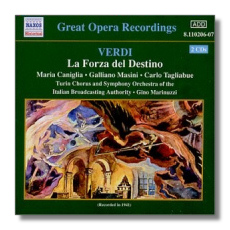
The Internet's Premier Classical Music Source
Related Links
- Verdi Reviews
- Latest Reviews
- More Reviews
-
By Composer
-
Collections
DVD & Blu-ray
Books
Concert Reviews
Articles/Interviews
Software
Audio
Search Amazon
Recommended Links
Site News
 CD Review
CD Review
Giuseppe Verdi

La Forza del Destino
- Maria Caniglia (Donna Leonora)
- Galliano Masini (Don Alvaro)
- Carlo Tagliabue (Don Carlo)
- Tancredi Pasero (Padre Guardiano)
- Ebe Stignani (Preziosilla)
- Saturno Meletti (Fra Melitone)
Turin Chorus & Symphony Orchestra of the Italian Broadcasting Authority/Gino Marinuzzi
Naxos Historical 8.110206-07 ADD monaural 2CDs: 75:00, 78:37
Back in the early 70s, this was my first recording of Forza; I bought it for $5 in a department store in Utica, New York as a set of three Everest/Cetra LPs, along with an Everest/Cetra Don Giovanni conducted by Max Rudolf. (That Don Giovanni was recently reissued on CD by Warner Fonit.) The 1941-vintage sound, electronically processed to simulate stereo, was ugly, but this teenaged collector could have done much worse, and the cost was a bargain, even at that time.
Marinuzzi's Forza has been available in one form or another for much of the past sixty-one years, and it's still a bargain for collectors. Because this Naxos Historical reissue lacks a libretto (there's a track-by-track synopsis, however), I wouldn't recommend it to someone who doesn't know their Forza from a hole in the ground or who demands modern recording technology. Also, as was the tradition at the time, this performance is slightly cut: the final Alvaro-Carlo confrontation in Act Three is missing. Nevertheless, powerful singing and savvy conducting make this a Forza to reckon with.
Maria Caniglia made several "completes" with Beniamino Gigli. She was a big-voiced dramatic soprano in the mold of Zinka Milanov and (earlier) Rosa Ponselle. If forced, her voice turned squally, and some of her high notes were unpleasant, but here, she is a complete Leonora in her poignancy and desperation. Tenor Galliano Masini is one of those singers who had (and continues to have) a small but vociferous group of partisans. Although his singing could be a little metallic and nasal, he had an exciting sound – one that was appropriate for heroes such as Alvaro and Aïda's Radames. He pours lots of emotion into the role of the hapless murderer of both Leonora's father and her brother. In the latter role, Carlo Tagliabue, another connoisseur's singer, also performs strongly, almost with as much character as Caniglia and Masini. Unlike Leonard Warren, a great Carlo of the 50s, Tagliabue doesn't ennoble the role – either vocally or dramatically. Still, this is a top-of-the-line portrayal. (A decade later, he recorded this role again – less successfully – with Maria Callas as his sister.) Ebe Stignani's Preziosilla is healthy if not particularly insightful. As Padre Guardiano, Tancredi Pasero is noble, sonorous, and, well, fatherly, and Saturno Meletti doesn't stint in making the bad-tempered Fra Melitone both comical and nasty. The smaller roles are well cast – Giuseppe Nessi's whining, wheedling Trabuco is memorable.
Marinuzzi reportedly disliked the Turin chorus and orchestra, and so it was supplemented by singers and musicians from La Scala. If nothing else, they contribute authenticity to the proceedings. This is Marinuzzi's only complete opera recording, and it is sad that his early death kept him from doing more. Steeped in Italian tradition, he nevertheless did not take the music for granted, and he binds Forza's disparate elements together exceptionally well. In his booklet note, Peter Bromley presents evidence to suggest that Marinuzzi was not an ally of Mussolini's Fascist government, as is sometimes supposed, but rather a man trapped into compliance, as his son was being held in a Nazi work camp. This was a sad period in world history, and Verdi's cinematic, dismayingly cynical Forza was a perfect mirror of the period.
The transfers from thirty-five Cetra 78-rpm sides have been done with care by Ward Marston, already a veteran of many Naxos Historical reissues. The dated monaural sound is very listenable, neither noisy nor excessively filtered.
Copyright © 2002, Raymond Tuttle














